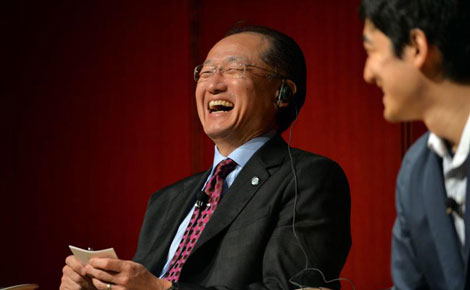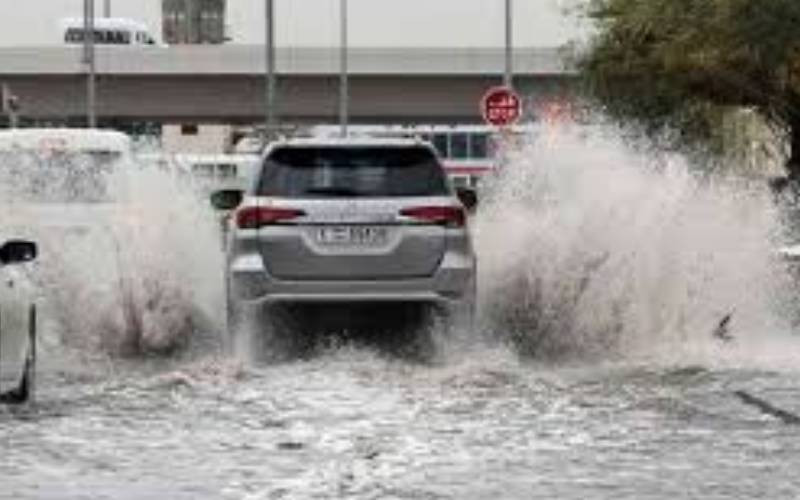 |
|
World Bank Group President Jim Yong Kim is all smiles as he talks with Japanese young entrepreneurs at a symposium in Tokyo on July 10, 2014. Kim is now here on a two-day visit to Tokyo to exchange views with Japanese officials. AFP PHOTO / Yoshikazu TSUNO |
Kenya: The World Bank Group committed a record-breaking Sh1.33 trillion ($15.3 billion) to Sub Saharan Africa's development in fiscal year 2014 (July 2013 to June 2014), supporting shared prosperity in the region and focusing on increased efforts to reduce poverty.
"Africa is making significant progress and at the World Bank we are stepping up the momentum to innovate and think big in order to help our clients achieve their development goals. We applaud the improved policies and prudent fiscal decisions many governments have made and we will continue to provide financing through loans and grants, technical expertise and to mobilise our unique convening power to leverage the resources of other development partners," said Makhtar Diop, World Bank Vice President for the Africa Region.
The bank continued its strong commitment to Africa, delivering $10.6 billion in new lending for 160 projects this fiscal year. These commitments included a new record of $10.2 billion in zero-interest credits and grants from the International Development Association (IDA), the World Bank's fund for the poorest countries. This is the highest level of IDA delivery by any region in the World Bank's history.
IFC's work in the private sector in Africa during the current financial year focused on bridging the infrastructure gap, promoting a productive real sector and leading inclusive business approaches to help drive growth and job creation. IFC investments on the continent amounted to more than $4.2 billion, with more than $3 billion committed in IDA countries and almost $800 million in fragile and conflict-affected states. IFC spent $55 million on Advisory Services programmes in the region, 96 per cent of which was distributed to IDA countries.
In FY 2014, MIGA issued guarantees of $515 million in support of projects in the oil and gas, power, services, and telecommunications sectors. The Agency also teamed up with the Overseas Private Investment Corporation to establish a $350-million political risk facility that will support planned investments in sustainable agribusiness in up to 13 countries throughout sub-Saharan Africa.
The World Bank worked collaboratively to tackle development challenges and focused on regional projects in sustainable energy, irrigation, water management, and food security, and also on job training programs for youth, preventing malaria and other tropical diseases, and on social protection for poor families across the region.
In FY14, the Group focused its efforts to act quickly and effectively in emergency situations across Africa. In response to the crisis in Central African Republic, the bank delivered emergency development funds of over $70 million to help restore key government services and to support food distribution and health services.
Major regional initiatives focused on the challenges of fragility and conflict. In November 2013, World Bank Group President Jim Yong Kim pledged $1.5 billion to boost economic growth and lift the people of Africa's Sahel Region out of devastating poverty. Kim's pledge came during a historic joint trip to the Sahel with UN Secretary-General Ban Ki-moon.
Sub-Saharan Africa is blessed with large hydro-power resources that can create electricity, yet only 10 per cent of its potential has been harnessed. Boosting access to affordable, reliable, and sustainable energy is a primary objective of the Bank's work in Africa. During the fiscal year (FY14) projects focused on developing hydro-power potential and providing new forms of sustainable power to increase energy production and benefit millions of Africans.
In a major push, IBRD, IFC, and MIGA combined forces under a joint Energy Business Plan for Nigeria. The plan will support Nigeria's energy reform program and help increase installed generation capacity by about 1,000 MW while mobilizing nearly $1.7 billion of private sector financing for Africa's largest economy. Many projects benefit from IBRD, IFC, and MIGA working together across the World Bank Group to better leverage their development impact in the region.
In FY14, the Bank also supported the 80-megawatt Regional Rusumo Falls Hydroelectric Project in Burundi, Rwanda, and Tanzania, and provided a $100-million grant to Burundi for the Jiji-Mulembwe hydro-power project. Both initiatives will increase electricity generation capacity to benefit millions of Africans.
 The Standard Group Plc is a
multi-media organization with investments in media platforms spanning newspaper
print operations, television, radio broadcasting, digital and online services. The
Standard Group is recognized as a leading multi-media house in Kenya with a key
influence in matters of national and international interest.
The Standard Group Plc is a
multi-media organization with investments in media platforms spanning newspaper
print operations, television, radio broadcasting, digital and online services. The
Standard Group is recognized as a leading multi-media house in Kenya with a key
influence in matters of national and international interest.
 The Standard Group Plc is a
multi-media organization with investments in media platforms spanning newspaper
print operations, television, radio broadcasting, digital and online services. The
Standard Group is recognized as a leading multi-media house in Kenya with a key
influence in matters of national and international interest.
The Standard Group Plc is a
multi-media organization with investments in media platforms spanning newspaper
print operations, television, radio broadcasting, digital and online services. The
Standard Group is recognized as a leading multi-media house in Kenya with a key
influence in matters of national and international interest.







